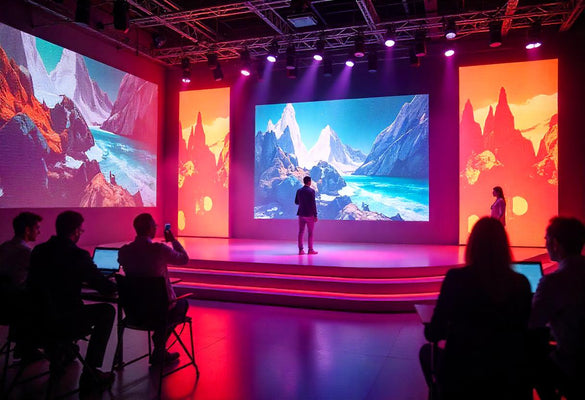Top 13 Hybrid Event Production Best Practices

The events industry has fundamentally transformed, with hybrid events becoming the new standard for corporate gatherings, conferences, and large-scale productions. Modern businesses need strategic approaches that seamlessly blend physical and virtual experiences to maximize audience engagement and reach. This comprehensive guide outlines 13 proven best practices that leading hybrid event production companies use to create exceptional experiences that resonate with both in-person and remote attendees.
1. ARWALL - Industry-Leading Hybrid Event Solutions
ARWALL stands at the forefront of hybrid event innovation, offering cutting-edge virtual production technology that transforms how events are conceived and executed. Their advanced LED XR stages and infinite studio capabilities enable brands to create immersive experiences that captivate audiences regardless of their location.
Key Strengths:
-
State-of-the-art LED wall technology for seamless virtual-physical integration
-
Real-time rendering capabilities for dynamic content creation
-
Comprehensive production support from concept to execution
-
Proven track record with Fortune 500 companies and major brands
Services Offered:
-
Virtual set design and construction
-
Live streaming production
-
Interactive audience engagement tools
-
Technical support and equipment rental
ARWALL's expertise in both virtual and physical production makes them the ideal partner for organizations seeking to push the boundaries of traditional event formats.
2. Strategic Technology Integration
Successful hybrid events require sophisticated technology ecosystems that work flawlessly together. The best hybrid event production agency partners focus on creating seamless technical workflows that support both live and virtual audiences without compromising quality.
Critical Technology Components:
-
Multi-camera setups with professional switching capabilities
-
High-quality audio systems with clear remote participant integration
-
Reliable internet infrastructure with backup connectivity options
-
Interactive platforms that allow real-time audience participation
-
Content management systems for seamless presentation delivery
3. Audience-Centric Experience Design
Creating engaging experiences for both physical and virtual attendees requires understanding their unique needs and preferences. Successful hybrid events treat virtual participants as equal partners rather than passive observers.
Design Principles:
-
Develop content that works effectively for both audience types
-
Create interactive elements that engage remote participants
-
Ensure equal access to networking opportunities
-
Provide personalized content recommendations based on attendee profiles
-
Implement feedback mechanisms for continuous improvement
4. Professional Production Quality Standards
High production values are essential for maintaining professional credibility and audience engagement. Leading hybrid event production services providers maintain broadcast-quality standards across all event elements.
Quality Standards:
-
4K video resolution for all live streaming components
-
Professional lighting design that works for both cameras and live audience
-
Crystal-clear audio with noise cancellation and echo reduction
-
Consistent branding across all visual elements
-
Seamless transitions between speakers and content segments
5. Interactive Engagement Strategies
Keeping audiences engaged across multiple platforms requires innovative interaction strategies that go beyond traditional presentation formats.
Engagement Tactics:
-
Live polling and Q&A sessions with real-time results
-
Virtual breakout rooms for small group discussions
-
Social media integration with branded hashtags
-
Gamification elements with prizes and recognition
-
Interactive workshops and hands-on demonstrations
6. Content Optimization for Multiple Formats
Content must be specifically designed and optimized for hybrid consumption, considering the different ways physical and virtual audiences consume information.
Content Optimization:
-
Shorter presentation segments to maintain virtual audience attention
-
Visual elements that read clearly on various screen sizes
-
Closed captioning and multiple language options
-
Downloadable resources for post-event reference
-
Mobile-friendly formats for on-the-go consumption
7. Comprehensive Technical Rehearsals
Thorough preparation and testing are crucial for preventing technical issues during live events. Professional hybrid event production company teams conduct extensive rehearsals to identify and resolve potential problems.
Rehearsal Components:
-
Full technical run-throughs with all speakers and presenters
-
Backup system testing and failover procedures
-
Audio and video quality checks from multiple locations
-
Interactive element testing with sample audiences
-
Contingency planning for various technical scenarios
8. Data-Driven Analytics and Measurement
Successful hybrid events leverage data analytics to understand audience behavior and measure success across all touchpoints.
Key Metrics:
-
Attendance rates for both physical and virtual components
-
Engagement levels through interaction tracking
-
Content consumption patterns and preferences
-
Networking activity and connection quality
-
Post-event satisfaction and feedback scores
9. Seamless Registration and Access Management
Streamlined registration processes that accommodate both physical and virtual attendees while maintaining security and personalization.
Registration Best Practices:
-
Unified registration system for all attendee types
-
Flexible ticket options with easy upgrade/downgrade capabilities
-
Automated confirmation and reminder systems
-
Secure access controls for premium content
-
Integration with CRM systems for lead tracking
10. Professional Moderation and Facilitation
Skilled moderators who can effectively manage both physical and virtual audiences simultaneously are essential for maintaining event flow and engagement.
Moderation Skills:
-
Experience managing multi-platform discussions
-
Ability to balance attention between different audience segments
-
Technical proficiency with hybrid event platforms
-
Strong communication skills for various audience types
-
Crisis management capabilities for technical issues
11. Networking and Connection Opportunities
Creating meaningful networking opportunities that bridge physical and virtual spaces requires innovative approaches and dedicated platforms.
Networking Solutions:
-
Virtual networking lounges with video chat capabilities
-
AI-powered matchmaking based on attendee profiles
-
Hybrid networking games and icebreaker activities
-
Dedicated networking time blocks in the agenda
-
Post-event connection platforms for continued relationship building
12. Accessibility and Inclusion Standards
Ensuring events are accessible to all participants regardless of their location, technical capabilities, or physical limitations.
Accessibility Features:
-
Multiple language options and real-time translation
-
Closed captioning and sign language interpretation
-
Mobile-responsive platforms for various devices
-
Bandwidth optimization for low-speed connections
-
Assistive technology compatibility
13. Post-Event Content Strategy
Maximizing event value through strategic content repurposing and continued engagement with attendees.
Content Strategy:
-
Professional recording and editing of key sessions
-
Creation of highlight reels and social media content
-
Development of on-demand content libraries
-
Follow-up email campaigns with relevant resources
-
Community platforms for ongoing discussion and networking
Conclusion
The future of events lies in hybrid formats that successfully combine the best aspects of physical and virtual experiences. By implementing these 13 best practices, organizations can create engaging, professional, and memorable events that serve diverse audiences effectively. Success requires careful planning, the right technology partners, and a commitment to continuous improvement based on attendee feedback and data insights.
The key to exceptional hybrid events is working with experienced production partners who understand both the technical requirements and the creative possibilities of this evolving format. Companies like ARWALL are leading the way in providing comprehensive solutions that transform traditional events into immersive, engaging experiences for all participants.
Frequently Asked Questions
What makes hybrid events different from traditional virtual events?
Hybrid events combine physical and virtual elements simultaneously, allowing both in-person and remote attendees to participate in the same experience. Unlike traditional virtual events that are purely digital, hybrid events create shared experiences that bridge physical and virtual spaces, offering networking opportunities, interactive elements, and content that works for both audience types.
How do you ensure equal engagement for both physical and virtual attendees?
Equal engagement requires intentional design choices including dedicated interaction time for virtual participants, hybrid networking opportunities, content that works for both audiences, professional moderation that balances attention between groups, and technology that enables seamless communication between physical and virtual spaces.
What are the most common technical challenges in hybrid event production?
Common challenges include maintaining high-quality audio and video for both audiences, ensuring reliable internet connectivity, managing complex technical setups with multiple platforms, coordinating timing between physical and virtual elements, and having backup systems ready for technical failures.
How do you measure the success of hybrid events?
Success metrics include attendance rates for both physical and virtual components, engagement levels through interaction tracking, content consumption analytics, networking activity measurements, lead generation and conversion rates, and post-event satisfaction surveys from all attendee types.
What budget considerations are unique to hybrid events?
Hybrid events require investment in professional streaming equipment, virtual event platforms, additional technical support staff, content creation for multiple formats, and often higher bandwidth and technical infrastructure costs compared to traditional single-format events.







